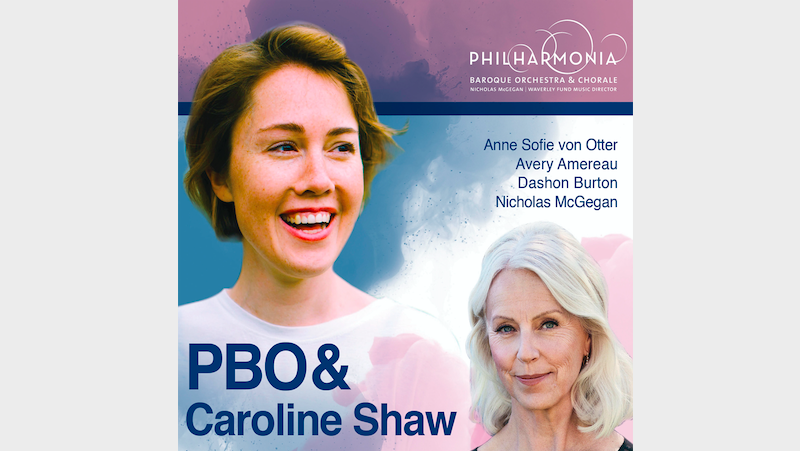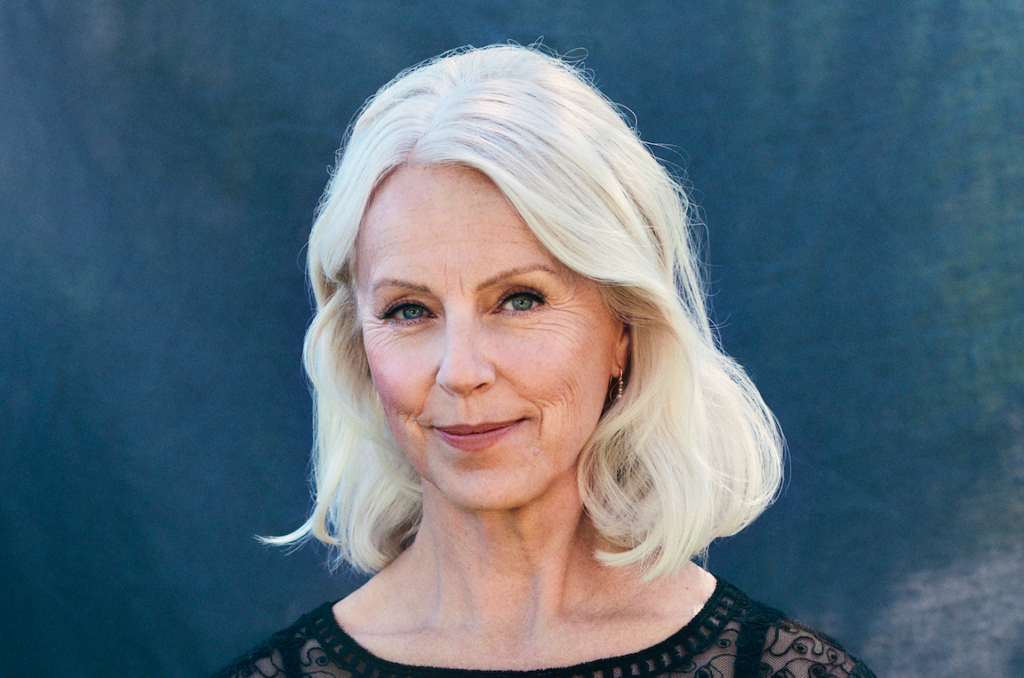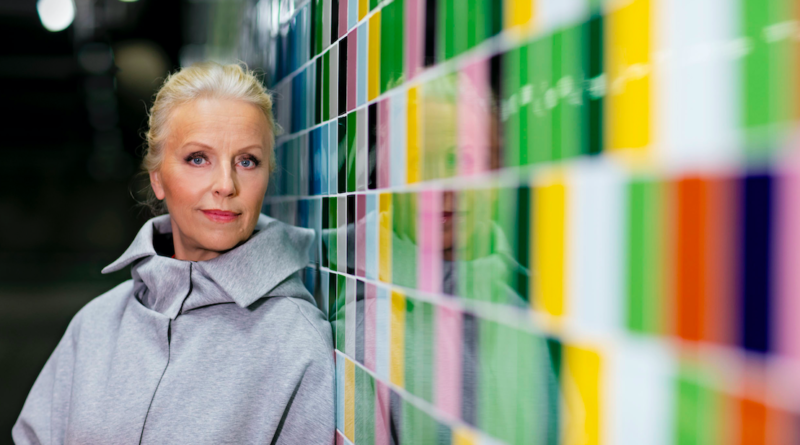INTERVIEW: Anne Sofie von Otter, in her own words
Photo: Ann Sofie von Otter is featured on the new album PBO & Caroline Shaw. Image courtesy of artist / Provided by Crossover Media with permission.
Anne Sofie von Otter is one of the most celebrated singers working in the realm of classical music today. She has performed live for audiences around the world, and her mezzo-soprano voice can be heard on many acclaimed recordings, including the new album PBO & Caroline Shaw, which finds von Otter offering a song cycle of Shaw’s compositions alongside the Philharmonia Baroque Orchestra & Chorale (PBO).
The operatic roles over her 30-plus years of musical dominance are almost too many to summarize. Some of her recent ones include Leocadia Begbick (Aufstieg und Fall der Stadt Mahagonny) at the Royal Opera House Covent Garden, Countess Geschwitz in Christoph Marthaler’s production of Lulu at Staatsoper Hamburg, Madame de Croissy (Dialogues des Carmélites) at Royal Swedish Opera, Geneviève (Pelléas et Mélisande) for Opéra National de Paris and The Old Lady (Candide) at Komische Oper Berlin in Barrie Kosky’s new production, according to her official biography.
Her discography is even more voluminous, with recent titles A Simple Song, So Many Things and Douce France attracting more and more listeners to her carefully measured and ever-strong vocal talents.
During the coronavirus pandemic, which continues to rage around the world, von Otter finds herself at home in Sweden awaiting news of when she can go back on the road and connect with her fans. Concert halls and opera houses have been closed in almost every country, and the delays in production look like they will extend well into 2021. Still, von Otter is looking for the silver lining.
“It was the right time of year to be in one place, in Sweden, because I really enjoy watching spring before my very eyes for the first time in many, many years,” von Otter said in a recent phone interview. “But, of course, in other ways it’s been terrible. I must say that for me at this point in my career, to be at home for three months was OK, and everyone around me has been safe and healthy — my family and friends. So I have not personally been badly affected by it in that way, but for the whole culture sector, of course, it’s terrible. The theaters and the concert halls and the opera houses are suffering, and all the artists without work and with no income, it’s terrible, of course, really, really horrible. And we can only hope that we can find a solution very soon.”
This pause in her carer has allowed von Otter to rest her voice. She lives a quiet life with little stress and no need to travel and endure the long lines at airports and the uncertainty of living out of hotels. She has never been in one place for this long, so it has taken some getting used to.
“I’ve been singing,” she reported. “I’ve been practicing. I’ve done some recordings with a few musicians to have something to do and to maybe hopefully give pleasure to other people to put out on the internet — not too bad at all. But I really sincerely hope that things get going again before too long because otherwise … it’s going to be so bad, so here’s hoping.”
Von Otter said she hopes that normal — whatever that may look like — will return in 2021. When she talked with Hollywood Soapbox it was becoming increasingly clear that her calendar in fall 2020 would not be filled with many, if any, concerts.
“I haven’t had many cancellations for the autumn yet because everyone is waiting week by week to see what’s happening, but if the concert halls can only take in 50 people, then there’s no way they can go through with their plans,” she said. “It gets too expensive for them to put on a show if it’s going to be like that, so I think my management is very worried that this whole autumn will go to pieces. And then it’s going to be not so good for anyone.”
While at home, she has not been reminiscing and listening to her older recordings, of which there are many. She seems to be the type of performer who likes to look ahead and not be nostalgic over her past triumphs. Sometimes if a new project tackles ground she has already covered years before, she’ll hunt out an old recording and see how she interpreted the piece earlier in her career, but that’s rare.
“Occasionally I’ll hear myself on the radio singing something from an old recording, and that’s always interesting, particularly if I don’t know that it’s me to begin with,” von Otter said with a laugh. “I hear a singer and some music, and then sometimes it takes me a while to realize that it’s me. And maybe I can’t identify immediately what the music is, and that’s really an interesting experience because you listen with somewhat objectivity. But I’m very, very, very proud of my recordings. I’ve enjoyed doing them, putting the programs together and the process, and I am the type of singer I don’t mind at all going into a studio and singing into a microphone. I find that exhilarating and very tiring, but very fun and satisfying. … I am really a recording-type artist. Not every artist is. They are much happier in front of live audience, but I enjoy both.”
The new album came about because of Nick McGegan, outgoing music director of the PBO who made last year his last one on the podium for the world-renowned orchestra. Von Otter loves working with the maestro, calling each experience “cool and easy.”
“We did a couple of takes, and then he asked was I happy and did the orchestra have anything to say or the sound engineer,” she remembered. “And if everyone was fine, then we want on to the next song. The music is not complicated. It was not rhythmically hard or put huge demands on singing in extreme ranges or things like that. … Caroline [the composer] is a natural kind of musician, and I think that’s how she wants her music to be, too. So it was mainly a very nice experience, a lovely experience.”



The mezzo-soprano didn’t start her career thinking that the solo life was the life for her. She knew she had a powerful instrument, but she was content singing choral music for many, many years.
“I didn’t know anything about singing,” she said of her early career. “I had no experience of going to the opera, or I didn’t know the difference between a tenor or a bass. It took me a while to understand that I had a gift for singing and that the gift was big enough to get me anywhere as a soloist. What I wanted to do was sing in a choir. I was a dedicated choir singer. I sang in many choir singers, and that’s how I learned my trade and learned music, reading music and different styles and contemporary music and Baroque music with different kinds of conductors. Then eventually I started getting solos, and that’s when it sort of gave me the idea that, oh, it’s fun. … So that’s how it started, and I had no fantasies of becoming an opera star at all. I just felt very, very strongly that I loved making music together with other people. And so one thing led to another, and here I am today. I’m very grateful for it, but as long as I’m making music with other people, that’s my main goal always.”
Over the past three decades, her voice has changed, which is only natural. Today, she sings beautifully and has won over critics and audiences, but she recognizes that she needs more time for warming up. That’s simply the life of a solo opera singer.
“As you age your voice has to age,” she said. “It would be an eighth wonder of the world if your voice didn’t age when you did, so it does. And it feels completely different to when I was 25. I have to work much harder and be much more focused, and I have to warm up longer. But then if I get my voice to sound the way I want it to, and I compare to what I sounded like 25 years ago, it’s very much still the same voice. Of course, without the absolute freshness of a young voice, but the stamp, the personality of the voice hasn’t changed. I’m able to do things now that I couldn’t 25 years ago, maybe have some new colors, but it’s still a very much light lyric voice. I do sing bigger, more dramatic things from time to time, and I’ve enjoyed that very much. But it is a very slim lyric voice, but I tell you it takes a lot of work to keep it going and have it sound fresh at my age. But I like that work, so I keep doing it.”
When von Otter branched out into the opera world, she had to overcome her initial nervousness. She found it quite challenging to walk around a stage in a costume and act in front of thousands of people; she was confident about her voice, but didn’t see herself as an opera star.
“I was very self-conscious and very shy as a performer,” von Otter admitted. “I somehow enjoyed it, but it was very hard. So it didn’t come naturally. It was nothing that I dreamt of doing or wanted to do, but I had a manager, an agent who said that this is the way you earn your living. You don’t earn your living very easily if you’re just going to do lieder or oratorio. It would be good for you to do opera, and that’s how you can earn your living so you can eat and live somewhere. So little bit against my will, that’s what I did. I auditioned for a position in an opera house, and I got my first job. … Indeed it was good for me. It developed me as a performer and my understanding of what I was singing about, etc., but I never thought about career. I wasn’t interested. I actually made a living from singing in all of these choirs in Stockholm. I sang in cathedral choir, in the radio choir, in the Bach choir, and I made enough money to survive. So I could have gone on doing that, but my manager had other plans for me. So I’m grateful to them, and I’m sure I would have gone that way myself slowly but surely because in the end I got tired of singing in a choir. And I haven’t looked back.”
By John Soltes / Publisher / John@HollywoodSoapbox.com
Anne Sofie von Otter is featured on the new album PBO & Caroline Shaw, from Philharmonia Baroque Productions. Click here for more information.

